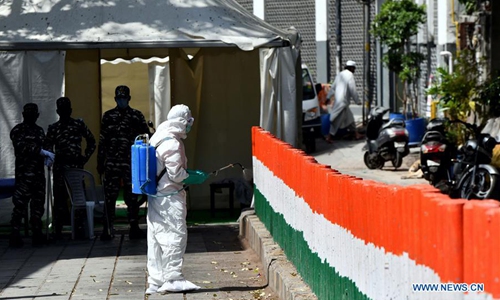Chinese embassy spokesperson urges India to treat investments from all countries equally

A health worker sanitizes an area near the Nizamuddin mosque in New Delhi, India, on April 10, 2020. India's federal health ministry Friday evening said the death toll due to COVID-19 rose to 206 and the total number of confirmed cases in the country reached 6,761. (Xinhua/Partha Sarkar)
A spokesperson of the Chinese embassy in India on Monday urged India to treat investments from all countries equally and revise relevant discriminatory practices.
"We hope India would revise relevant discriminatory practices, treat investments from different countries equally, and foster an open, fair and equitable business environment," Counselor Ji Rong said in a statement published on the website of the Chinese embassy in India.
India's Department for Promotion of Industry and Internal Trade has recently revised its foreign investment policy, making it much difficult for companies from countries sharing land border with India, including China, to invest in the country.
As of December 2019, China's cumulative investment in India has exceeded 8 billion U.S. dollars, far more than the total investments of India's other border-sharing countries.
"The impact of the policy on Chinese investors is clear," Ji said.
"Chinese investment has driven the development of India's industries, such as mobile phone, household electrical appliances, infrastructure and automobile, creating a large number of jobs in India, and promoting mutual beneficial and win-win cooperation," he said.
Facing the economic downturn caused by COVID-19, Ji said countries should work together to create a favorable investment environment to speed up the resumption of companies' production and operation.
"The additional barriers set by Indian side for investors from specific countries violate WTO's principle of non-discrimination, and go against the general trend of liberalization and facilitation of trade and investment," said the spokesperson.
"More importantly, they do not conform to the consensus of G20 leaders and trade ministers to realize a free, fair, non-discriminatory, transparent, predictable and stable trade and investment environment, and to keep our markets open," Ji added.
